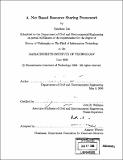A .net based resource sharing framework
Author(s)
Lin, Xiaohan
DownloadFull printable version (13.28Mb)
Other Contributors
Massachusetts Institute of Technology. Dept. of Civil and Environmental Engineering.
Advisor
John R. Williams.
Terms of use
Metadata
Show full item recordAbstract
This thesis presents an Internet resource sharing architecture. It allows users to access and utilize unused computer resources, such as CPU cycles and storage, without an expert's knowledge. It achieves this by providing a number of abstract services that hide some of the complexity inherent in distributed computing. In recent years, Grid Computing has been proposed as a solution for Internet resource sharing. However, Grid Computing as presently implemented does not address the need of the large majority of the users. In this thesis, we propose a different approach to achieve Internet resource sharing called the Realm. The Realm Framework offers a lightweight layer on top of the Microsoft .Net Framework so that the programs that can be migrated to .Net Framework can also utilize the shared resources through the Realm Framework. By leveraging the Microsoft .Net Framework, the Realm Framework avoids tedious re-working in this fast-paced world of technology by sitting on the top of the full-featured, coherent and up-to-date development platform. The Realm Framework applies current technologies such as Web Services, the Common Language Runtime (CLR) and popular encryption algorithms. (cont.) In this thesis a versatile runtime system and a set of extension interfaces in C# programming language is developed. The modularized software package offers a layered programming model for distributed-application developers with different levels of proficiency. Two utilities that are helpful for maintaining a distributed system are also developed, namely, a dynamic domain-name based inter-realm communication scheme and a distributed debugger. Examples of applying the Realm Framework to several typical scenarios are shown, including embarrassingly parallel problems that require little communication between computing nodes, parallel computing problems that require intensive message-passing between the computing nodes, and universal storage systems that are based on storage media and the messenger-like applications that require a sophisticated communication scheme.
Description
Thesis (Ph. D.)--Massachusetts Institute of Technology, Dept. of Civil and Environmental Engineering, 2006. Includes bibliographical references (p. 121-124).
Date issued
2006Department
Massachusetts Institute of Technology. Department of Civil and Environmental EngineeringPublisher
Massachusetts Institute of Technology
Keywords
Civil and Environmental Engineering.